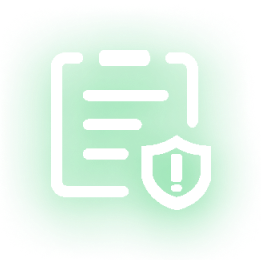All-in-one Website Monitoring Solution
-

- Uptime Monitoring
- Continuously monitor website uptime.
-

- SSL Monitoring
- Ensure SSL certificate validity to prevent browser security warnings.
-

- Domain Monitoring
- Mitigate business continuity and security risks related to domain expiration.
-

- DNS Monitoring
- Retrieve domain resolution status from major DNS providers.
-

- Defacement Monitoring
- The first line of defense against website defacement and unauthorized content changes.
-

- Keyword Monitoring
- Periodically monitor website content for specified keywords.
-

- Data Leak Check
- Protect against leaks of Pll, Cloud Keys, and other sensitive data.
-

- External Link Check
- Monitor changes in external link count and uptime.
-

- Reputation Check
- Assess risk and reputation of referenced IPs and domains.
-

- Malicious Code Check
- Continuously detect malicious code injections.
-

- HTTP Header Check
- Check HTTP security header configuration.
-

- Website Technology Check
- Analyze website technology stack.
Knowledge Hub > Other
Explore educational articles to deepen your understanding in technical domains.
-
Essential Reading List for Cybersecurity Professionals
The relentless battle against evolving cyber threats demands continuous learning as your strongest armor. This carefully curated collection equips website operators, cybersecurity engineers, and IT managers with tools to master critical monitoring domains and strengthen organizational resilience.
-
Global Data Privacy Regulations: Overview & Compliance Strategies
Data privacy regulations aim to protect personal information from misuse while granting individuals control over their data. In the modern era, data breaches and privacy violations make headlines daily, governments worldwide are enforcing stringent data protection laws. From the EU’s GDPR to China’s PIPL, over 130 countries have enacted privacy frameworks. Businesses face a fragmented landscape of regulations recently, Non-compliance risks hefty fines, legal disputes, and reputation damage. This guide unpacks key global data privacy regulations and their implications. Major Global Data Privacy Regulations 1. GDPR (EU/EEA) Scope: Applies to any entity processing EU residents’ data, regardless of location. Key Requirements: Consent for data collection must be explicit, informed, and withdrawable. Mandatory breach notifications within 72 hours. Appoint a Data Protection Officer (DPO) for large-scale processing. Allow data access, correction, and deletion (“Right to be Forgotten”). Penalties: Up to €20 million or 4% of global annual revenue (whichever is higher). 2. CCPA/CPRA (California, USA) Scope: Affects businesses handling California residents’ data with annual revenue >$25M or processing data of 50k+ users. Key Rights: Transparency into data collection and usage. Let users opt out of data sales. Limit data retention to “reasonably necessary” periods. Penalties: Up to $7,500 per intentional violation. 3. PIPL (China) Scope: Applies to all entities processing personal data in China. Key Requirements: Obtain separate consent for sensitive data (biometrics, health, financial). Sensitive data must be stored onshore unless approved for export. Store critical data locally and mandatory security assessments for large-scale data transfers. Notify users and authorities within 72 hours of breaches. Penalties: Fines up to 50M CNY or 5% of annual revenue. 4. LGPD (Brazil) Scope: Mirrors GDPR but applies to businesses operating in Brazil or targeting Brazilian residents. Key Requirements: Appoint a Data Protection Officer (DPO) for high-risk processing. Conduct risk assessments for data processing…


